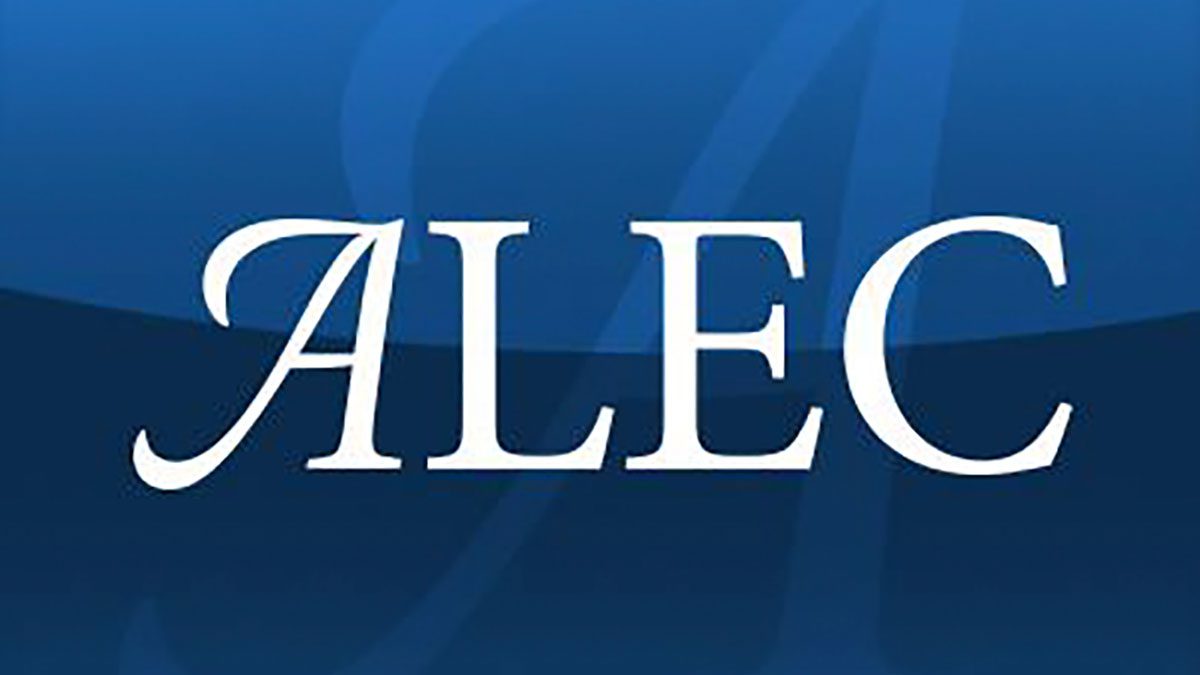No, ALEC is not a new kid on the block. ALEC is the American Legislative Exchange Council.
ALEC was born in 1973 – the brainchild of Paul Weyrich and a group of Republican Party state legislators. This was not Weyrich’s first brainchild: he also fathered the Heritage Foundation and somewhere along the way coined the expression: “the moral majority.”
ALEC says it is not a lobby and not a front group. ALEC describes itself as a non-partisan, non-profit organization. Bloomberg Businessweek (BBW; Dec. 5-11, 2011, p. 68) found 92 ALEC veterans in the U.S. House of Representatives, 87 of them Republicans, and 9 in the U.S. Senate, all but one of them Republicans. John Nichols of The Nation discovered that ALEC “currently has one Democrat out of 104 [state] legislators in leadership positions.”
ALEC has two boards of directors. The public board of directors for 2011 (when Noble Ellington was ALEC’s national chairman) consisted of 23 state legislators who sign off on “model bills” and set national priorities. The 24-member private enterprise board provides a counterpart to the public board of directors, consisting wholly of corporate representatives. For example, Big Pharma is represented by Bayer, GlaxoSmithKline, Johnson & Johnson, and Pfizer (BBW, p. 70).
Under these paired boards of directors are nine “task forces” covering different subject areas. Their “task” is to draft legislative bills that will become ALEC “model bills” and be placed in an on-line library accessible solely to the ALEC membership of over 2,000 state legislators and 300 corporations. This library now contains over 800 samples of model legislation, all carefully crafted best to serve corporate interests. The organizational structure effectively gives each corporate member a veto (BBW, p. 69).
The main function of ALEC is therefore to bring state legislators, companies, and special interest advocacy groups together in the effort to develop this model legislation. According to ALEC itself, a state legislator somewhere in the country introduces one of its bills about 1,000 times a year. And about 200 times a year one of its bills becomes law in some state! ALEC, in effect, makes national policy by acting incrementally at the state level.
The BBW article “Pssst… Wanna Buy a Law?” reveals that the 2,000+ state legislators who belong to ALEC pay annual dues of $50 each. The 300 or so corporations, think tanks, and trade groups that belong to ALEC pay annual dues of at least $25,000 each and can spend more to sponsor meetings. For instance, ExxonMobil (according to tax records) gave ALEC $30,000 in 2005 and again in 2006 through its foundation. ExxonMobil spokesman Alan Jeffers says that in 2010 the company paid $39,000 in dues, sponsored a reception at ALEC’s annual meeting in San Diego for $25,000, and spent $45,000 to sponsor a workshop on natural gas in New Orleans. ALEC also receives direct grants from corporations – for example, $1.4 million from ExxonMobil over the period 1998–2009. ALEC has an annual budget of $7 million, 99% of which comes from its corporate members (BBW, p. 69).
The Task Forces and Their Tasks
(1) Civil Justice Task Force
Co-chairs: Senator Bill Seitz (R—Ohio) and Victor Schwartz (chairman of the Public Policy Group at the legal firm of Shook, Hardy & Bacon and registered lobbyist for Peabody Energy, Eli Lilly & Co., and the U.S. Chamber of Commerce.
Shook, Hardy & Bacon represent coal and other energy companies against regulation of carbon dioxide (CO2) emissions:
In 2005, coal-derived electricity was responsible for 7.856 gigatons (billions of tons) of CO2 emissions or 30% of all worldwide CO2 emissions, and 72% of CO2 emissions from power generation (“Full Cost Accounting for the Life Cycle of Coal,” special issue on ecological economics of the Annals of the New York Academy of Sciences, at http://onlinelibrary.wiley.com/doi/10.1111/j.1749-6632.2010.05890.x/full)
(2) Commerce, Insurance, and Economic Development Task Force
Co-chairs: Representative Glenn Vaad (R—Colorado) and Emory Wilkerson (State Farm Mutual Automobile Insurance Company)
(3) Education Task Force
Co-chairs: Senator David Casas (R—Georgia) and Mickey Reuenaugh (co-founder and senior vice president of state relations at Connections Academy).
(4) Energy, Environment, and Agriculture Task Force
Co-chairs: Representative David Wolkins (R—Indiana), Martin Shultz (senior policy director of the government relations group at the corporate law firm Brownstein Hyatt Farber Schreck, former vice president of government affairs at Pinnacle West Capital Corporation), and Tom Moskitis (managing director of external affairs and registered lobbyist for the American Gas Association, which represents natural gas companies and lobbies for pro-drilling legislation at state and federal level).
Currently one of the main concerns of the gas companies is to oppose restrictions on the practice of fracking, in which water, sand, and chemicals are pumped deep underground at high pressure to extract gas from shale formations. Fracking has been shown to deplete and contaminate water supplies. When conducted near seismic fault lines, it can trigger earthquakes, as most recently in northeast Ohio (see: http://www.journalgazette.net/article/20120106/EDIT07/301069971/1021/EDIT).
(5) Health and Human Services Task Force
Co-chairs: Representative Leah Vukmir (R—Wisconsin) and Marianne Eterno (assistant vice president of government relations at Guarantee Trust Life Insurance)
(6) International Relations Task Force
Co-chairs: Representative Harold Brubaker (R—North Carolina) and Brandie Davis (director of U.S. affairs at Philip Morris International – the world’s largest tobacco company)
Philip Morris is notorious for making its cigarettes appeal to children by using flavored tobacco and animated cartoon characters like Joe the Camel. While it now publicly claims to be against children smoking, in fact its advertising still targets children (see: http://www.tobaccofreekids.org/research/factsheets/pdf/0011.pdf).
(7) Criminal Justice and Homeland Security Task Force, now renamed the Public Safety and Elections Task Force
Co-chairs: Representative Jerry Madden (R—Texas) and Stacie Rumenap (president of Stop Child Predators, former registered lobbyist for the American Conservative Union). The corporate co-chair in 2011 was Tara Rielly-Mica, a lobbyist for the National Rifle Association.
(8) Tax and Fiscal Policy Task Force
Co-chairs: Senator Jim Buck (R—Indiana) and Bob Williams (founder and senior fellow of the Evergreen Freedom Foundation, a “libertarian” think tank).
(9) Telecommunications and Information Technology Task Force
Co-chairs: Representative Blair Thoreson (R—North Dakota) and Bartlette Cleland (director of the IPI Center for Technology Freedom at the Institute for Policy Innovation, registered lobbyist for the Technology Association of America, former registered lobbyist for the Information Technology Association of America and Americans for Tax Reform).
ALEC’s spokespeople refer to ALEC as a library service available to companies and legislators. John Stephenson of ALEC’s Telecommunications and Information Technology Task Force says: “They see what they want. They don’t need me to access the legislation.” Reporting a conversation with Stephenson and Thoreson, BBW remarks that they describe an idealized process in which a “citizen” or “constituent” comes to a legislator who then turns to ALEC for help, but adds: “This doesn’t seem to be what actually happens.”
The ALEC “library” contains a bill that would limit how much a parent company might have to pay for asbestos-related injuries or illness caused by a company it acquires. Another bill would ban cities and counties from requiring restaurants to post nutritional information or food ingredients. Yet another would shift the tobacco tax burden from big cigarette makers such as Altria Group to smaller chewing tobacco companies.
“At last year’s meeting [2010] the energy task force passed a resolution proposed by the Edison Electric Institute, a trade group representing electric utilities, to urge the Environmental Protection Agency not to define coal ash as a hazardous waste” (BBW, p. 71).
Indeed, these hardly seem to be laws that would appeal to the sort of people normally associated with the words “constituent” and “citizen.”
Officially, ALEC says that it has nothing to hide about its corporate members. But at ALEC’s annual conference the single-page agenda handed out to non-member visitors did not show the names of presenters, list public and private sector board chairs, or indicate who had sponsored the meeting. The substantial booklet distributed to members, however, gave detailed descriptions of every workshop, devoted several pages to conference sponsors, and listed the legislators and company representatives who served on the boards of directors, led the task forces, and acted as state chairs.
When bloggers from the website “Think—Progress” tried to photograph the ten-foot-high panels outside the meeting showing the logos of conference sponsors such as United Health Care, J & J, and Altria, they were hustled out by security guards. Another blogger from AlterNet was denied credentials and then kicked out of the public lobby of the hotel [the New Orleans Marriott] two days in a row for tweeting the names of ALEC members who passed by him.
Unofficially, ALEC makes it hard to figure out who their private sector members are and who contributes what to the writing of model legislation. ALEC’s workshops are open to the press. The meetings of its task forces, however, are closed: there corporate members are busy at work. The U.S. Chamber of Commerce, for example, proposed that all high school students should be required to take a class in “free enterprise” as a condition of graduation.
Regan Weber, a conference spokeswoman, sent an e-mail to the reporters covering the event warning that their credentials would be taken away if they continued to interview ALEC members – most of whom are elected officials – without setting up appointments through ALEC’s press office. Isn’t providing access to elected officials the very essence of lobbying?
Common Cause filed a complaint with the Internal Revenue Service on July 14, 2011 to the effect that ALEC is engaged in lobbying and therefore not entitled to tax-exempt status as a 501(c)(3) classified non-profit educational organization. If it lost its tax-exempt status, donations to ALEC from businesses and foundations would no longer be tax-deductible.
Perhaps one of the most interesting – certainly one of the most compelling – things about ALEC is that the liberal Democratic magazine The Nation, that bastion of liberal elitism National Public Radio, and the business magazine Bloomberg Businessweek all have complaints about ALEC, its process and its program – that is, what it does and how it does it. If ALEC’s aims and actions unsettle such diverse groups and interests, it surely warrants further investigation – and counteraction.



